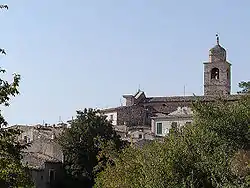Caramanico Terme
Caramanico Terme is a comune and town in the province of Pescara in the Abruzzo region of Italy, situated near the confluence of the Orfento and Orta rivers, on a hilltop between the Monte Morrone and the Majella mountains.[3]
Caramanico Terme | |
|---|---|
| Comune di Caramanico Terme | |
 | |
 Coat of arms | |
Location of Caramanico Terme 
| |
 Caramanico Terme Location of Caramanico Terme in Italy  Caramanico Terme Caramanico Terme (Abruzzo) | |
| Coordinates: 42°09′N 14°0′E | |
| Country | Italy |
| Region | Abruzzo |
| Province | Pescara (PE) |
| Frazioni | De Contra, San Nicolao, San Tommaso, San Vittorino, Santa Croce, Sant'Elia, Scagnano |
| Government | |
| • Mayor | Mario Mazzocca |
| Area | |
| • Total | 84.55 km2 (32.64 sq mi) |
| Elevation | 650 m (2,130 ft) |
| Population (2010)[2] | |
| • Total | 2,030 |
| • Density | 24/km2 (62/sq mi) |
| Demonym(s) | Caramanichesi |
| Time zone | UTC+1 (CET) |
| • Summer (DST) | UTC+2 (CEST) |
| Postal code | 65023 |
| Dialing code | 085 |
| Website | Official website |
History

invernal view of Caramanico Terme
The town takes its name from either cara, meaning rock, or from arimannia, a Lombard establishment in the late Middle Ages. Then the name Terme was added in 1960 because of the presence of a spa nearby.
The present settlement is recorded since Lombard times. Then it underwent a remarkable development in the 14th-15th centuries, under the D'Aquino family, and in that period many important monuments were built.
In 1706 an earthquake nearby destroyed the town.
The surname "Caramanica" may have originated from this area.[4]
Main sights

the Salle castle
- Church of S. Maria Maggiore (15th century), with a Gothic exterior and an ogival portal with a depiction of the Coronation of the Virgin (1476). The exterior has also depictions of apostles, pilgrims and singers with 15th century musical instruments. The Assumption Chapel (17th century) has a Baroque interior.
- Romanesque church of St. Tommaso, founded in the 13th century in honor of Thomas of Canterbury. It was built above a 9th-century pieve. It has a nave and two aisles, with different levels. The façade has a rose window and single mullioned windows, three portals and four semi-colons from a never built portico. The side portals have with floreal decorations, while the central one has a high-relief of the Twelve Apostles and Christ Enthroned (1118). The interior, with a nave and aisles divided by composite columns (right) and square columns (left). The interior houses also a Corinthian column (known as Colonna santa) which has alleged miraculous properties.
- Archaeological Museum "P. Barrasso"
- Museum of Abruzzo and Italy Fauna
- Hermitage of San Giovanni all'Orfento
References
- "Superficie di Comuni Province e Regioni italiane al 9 ottobre 2011". Istat. Retrieved 16 March 2019.
- "Popolazione Residente al 1° Gennaio 2018". Istat. Retrieved 16 March 2019.
- https://web.archive.org/web/20061028065435/http://abruzzo2000.com/abruzzo/pescara/caramanico.htm
- Ancestry.com http://www.ancestry.com/name-origin?surname=caramanica. Missing or empty
|title=(help)
This article is issued from Wikipedia. The text is licensed under Creative Commons - Attribution - Sharealike. Additional terms may apply for the media files.